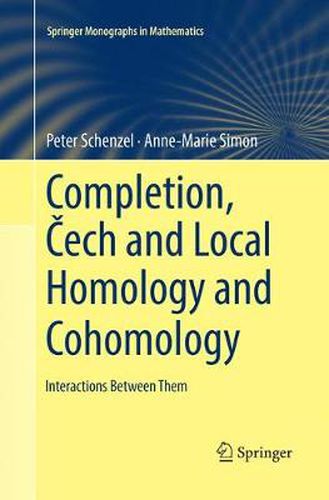Readings Newsletter
Become a Readings Member to make your shopping experience even easier.
Sign in or sign up for free!
You’re not far away from qualifying for FREE standard shipping within Australia
You’ve qualified for FREE standard shipping within Australia
The cart is loading…






This title is printed to order. This book may have been self-published. If so, we cannot guarantee the quality of the content. In the main most books will have gone through the editing process however some may not. We therefore suggest that you be aware of this before ordering this book. If in doubt check either the author or publisher’s details as we are unable to accept any returns unless they are faulty. Please contact us if you have any questions.
The aim of the present monograph is a thorough study of the adic-completion, its left derived functors and their relations to the local cohomology functors, as well as several completeness criteria, related questions and various dualities formulas. A basic construction is the Cech complex with respect to a system of elements and its free resolution. The study of its homology and cohomology will play a crucial role in order to understand left derived functors of completion and right derived functors of torsion. This is useful for the extension and refinement of results known for modules to unbounded complexes in the more general setting of not necessarily Noetherian rings.
The book is divided into three parts. The first one is devoted to modules, where the adic-completion functor is presented in full details with generalizations of some previous completeness criteria for modules. Part II is devoted to the study of complexes. Part III is mainly concerned with duality, starting with those between completion and torsion and leading to new aspects of various dualizing complexes.
The Appendix covers various additional and complementary aspects of the previous investigations and also provides examples showing the necessity of the assumptions.
The book is directed to readers interested in recent progress in Homological and Commutative Algebra. Necessary prerequisites include some knowledge of Commutative Algebra and a familiarity with basic Homological Algebra. The book could be used as base for seminars with graduate students interested in Homological Algebra with a view towards recent research.
$9.00 standard shipping within Australia
FREE standard shipping within Australia for orders over $100.00
Express & International shipping calculated at checkout
This title is printed to order. This book may have been self-published. If so, we cannot guarantee the quality of the content. In the main most books will have gone through the editing process however some may not. We therefore suggest that you be aware of this before ordering this book. If in doubt check either the author or publisher’s details as we are unable to accept any returns unless they are faulty. Please contact us if you have any questions.
The aim of the present monograph is a thorough study of the adic-completion, its left derived functors and their relations to the local cohomology functors, as well as several completeness criteria, related questions and various dualities formulas. A basic construction is the Cech complex with respect to a system of elements and its free resolution. The study of its homology and cohomology will play a crucial role in order to understand left derived functors of completion and right derived functors of torsion. This is useful for the extension and refinement of results known for modules to unbounded complexes in the more general setting of not necessarily Noetherian rings.
The book is divided into three parts. The first one is devoted to modules, where the adic-completion functor is presented in full details with generalizations of some previous completeness criteria for modules. Part II is devoted to the study of complexes. Part III is mainly concerned with duality, starting with those between completion and torsion and leading to new aspects of various dualizing complexes.
The Appendix covers various additional and complementary aspects of the previous investigations and also provides examples showing the necessity of the assumptions.
The book is directed to readers interested in recent progress in Homological and Commutative Algebra. Necessary prerequisites include some knowledge of Commutative Algebra and a familiarity with basic Homological Algebra. The book could be used as base for seminars with graduate students interested in Homological Algebra with a view towards recent research.